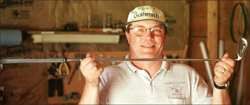|
Custom
club-maker finds a fit on island Jul 11 2001 12:00AM By |
 When
golfers buy equipment, they pay too much for something that does them
absolutely no good - product advertising.
When
golfers buy equipment, they pay too much for something that does them
absolutely no good - product advertising.
Not only that, Mike Truan says, the advertising steers them in the wrong direction - buying equipment that the pros use, instead of clubs built for golfers with more modest physical abilities. So, frustrated by an inability to find equipment that genuinely fit his short-ish stature, he began tailor-making golf clubs. Now Bainbridge Custom Clubs is a full-service business, operating out of Truan's garage on Nakata Place. "People need a type of golf club fitted to his or her own game," Truan said. "The club should fit the swing rather than the swing fitting the club." Truan buys the basic components - clubheads, shafts and grips - from different suppliers. He does the fitting, then assembles the clubs. He begins by taking the critical measurements - the distance from the crease of the wrist to the floor, and the clubhead speed and acceleration the customer can muster. Those items control the basics of club length, weight and shaft material. "Graphite shafts lighten the overall weight of the club, and enable you to hit the ball farther with less effort," he said. "They are usually the best choice for older players. But a lot of younger players swing so hard they need the extra weight to slow their tempo." Once those parameters are established, Truan turns to other aspects of the game. "Golf is probably the most mental game there is," he said. "If you don't like the way a club looks, you're not going to be comfortable hitting it." So the clubhead is chosen basically for appearance - how comfortable the buyers are with what they see when they stand up to the ball. The clubheads are then glued onto the shafts with a long-lasting epoxy. Finally, the grips are selected for comfort from more than 100 choices. Basic prices are comparable to or less than the premium club brands, Truan said. A set of eight irons goes for $295 in steel shafts and $420 in graphite shafts. Woods are $58 with steel shafts, $73 with graphite. Most materials must be ordered, but Truan can turn out a full set in a week to 10 days. He also does club repair and modification, including changing shafts and grips, which constitutes half his business. Originally from North Carolina, Truan was a career Navy man who took up golf while stationed in Hawaii. After he retired in 1990, he wanted to start playing again, but found the process intimidating. "I spent $700 on clubs," he said, "and walked out knowing that I didn't know enough to make an intelligent decision." So he started reading about club-making. When his son wanted to start playing, Truan decided that instead of buying clubs, he would get the components from the Golfsmith company and make them. "I got hooked," he said. "I made a set for myself, then I decided, why not make it a business?" In 1998, Truan went took classes at Golfsmith's Austin, Texas, headquarters, passed a test and was certified as an advanced club-maker. "This was a hobby that went so far awry it became a business," Truan said. A custom set not only offers tailored clubs, but a tailored club selection. "Go into a store, and the standard set of irons is a 3-iron through a pitching wedge," he said. "But how many amateurs use a 3-iron? It's hard to hit. Most golfers would be better off instead with one of the lofted woods, like a 5-wood or 7-wood." Truan can also make woods with honest-to-goodness, tree-grown wood. But there is little market for such clubs, because metal is so much more versatile. "Metal can be shaped so that you can have a large clubhead with a low center of gravity," he said. "If the center of gravity of the club is lower than the center of gravity of the ball, the ball goes in the air. And for most amateurs, getting the ball into the air consistently is the first step." As for his own game, Truan is distinctly average, both in ability -- "a 16-18 handicap" -- and optimistic attitude -- "I could be a 12 if I played more." While custom clubs may not make one a pro, Truan says the greater comfort factor will improve the average golfer's enjoyment of the game. "When I play, I want it to be a pleasure," he said. "I don't want to feel like I've been beaten up."
|